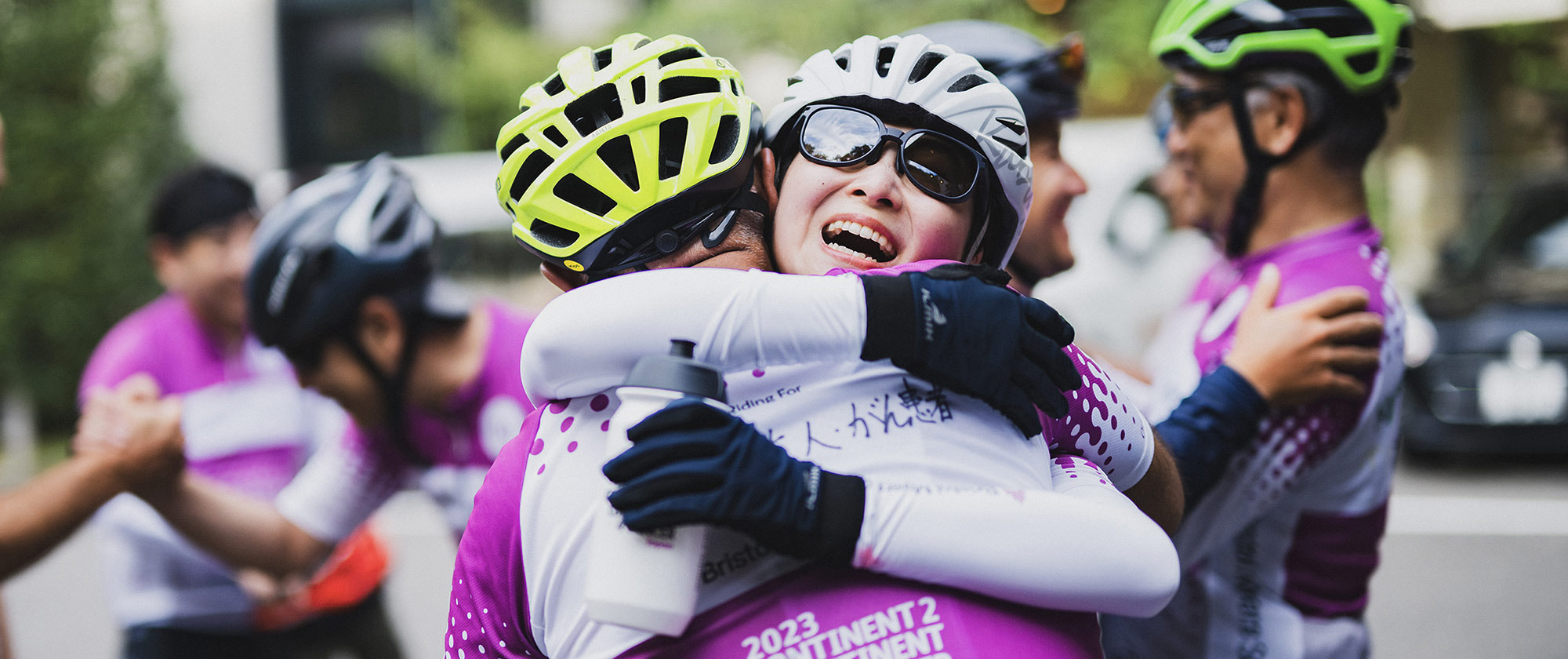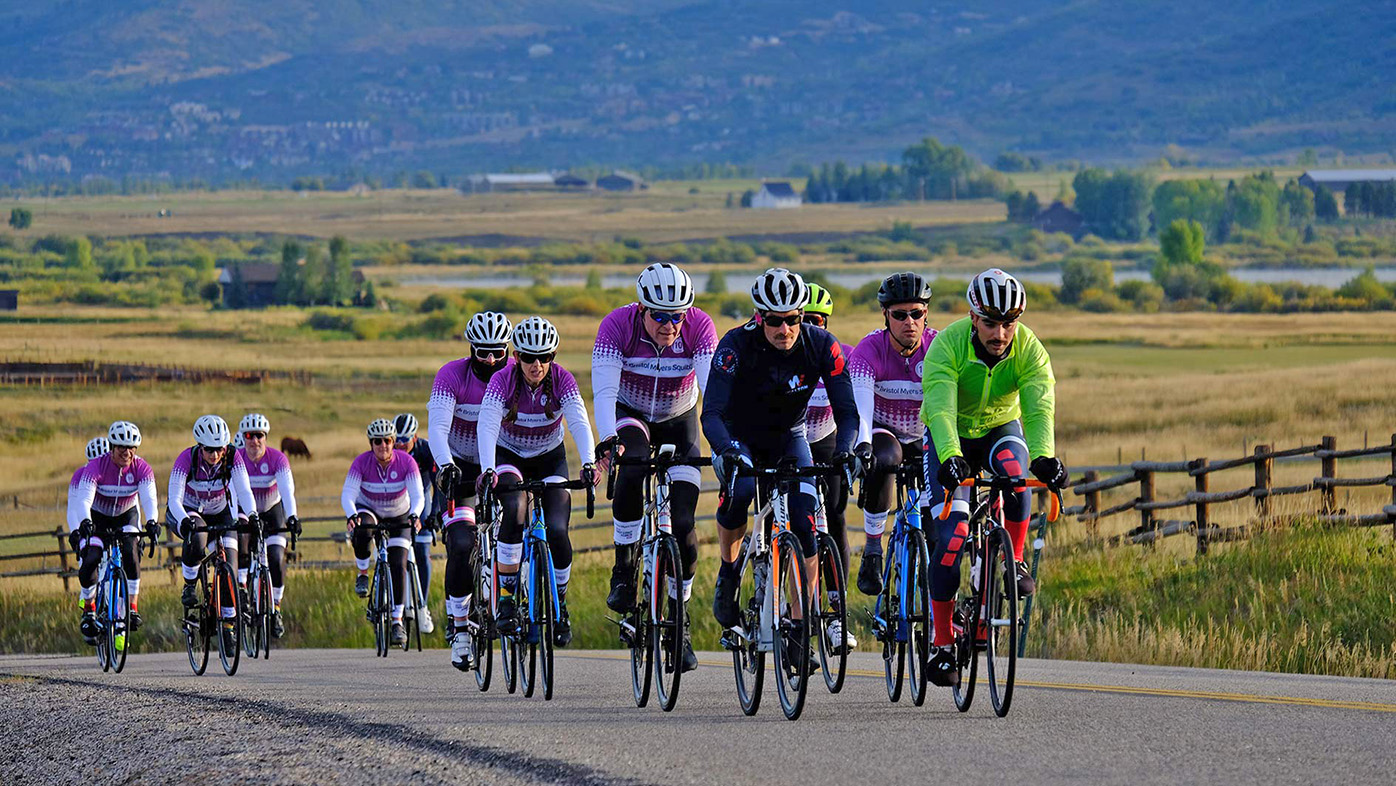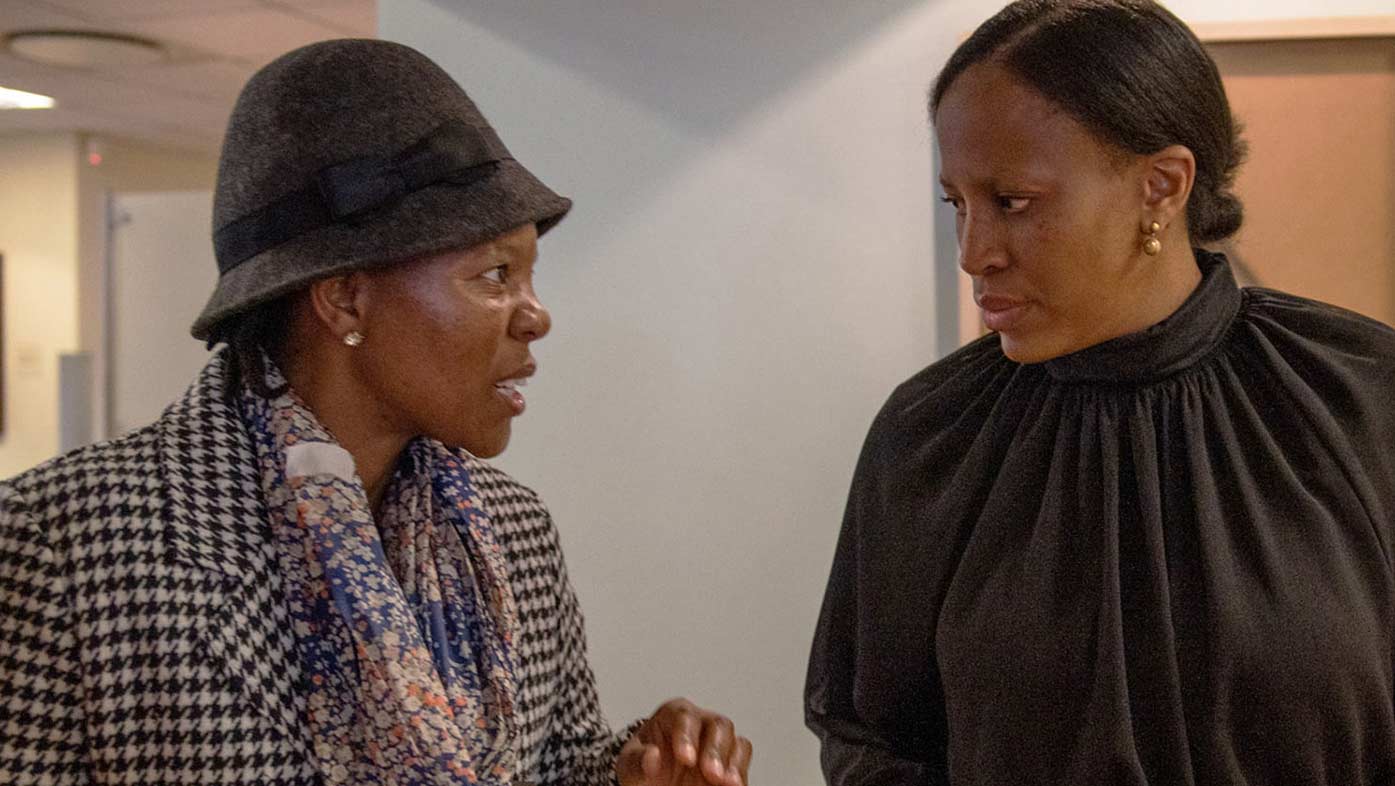'It was something I'll never forget'
First-time C2C4C riders challenge themselves throughout the world to help cancer patients
A handful of days stand between Alan Serres Cores and his first C2C4C bike ride, a Bristol Myers Squibb tradition that since 2014 has raised more than $16 million for cancer-focused nonprofits around the world.
And he is so ready.
The Latin America squad he’s riding with is the last of four teams of BMS employees who are challenged to their limits in the annual event. Employees from Europe, Japan and the United States have completed their rides.
Depending on the locations of the rides, the first two Cs in the name can represent coast to coast, country to country or continent to continent. The third C stands for cancer. The heart of C2C4C is patients and raising money for cancer research.
The ride began in 2014 when a group of oncology employees in the United States wanted to do more to help cancer patients. It expanded to Europe in 2016, Japan in 2021 and Latin America in 2022. This year’s rides include hundreds of employees representing more than 30 nations.
Alan Serres Cores is eager to honor his mother, aunt and other cancer patients when he rides one of the final legs in this year's C2C4C events around the world.
Serres Cores, a labeling project manager for Latam Regulatory Affairs in Argentina, is riding in honor of his mother, who died not long after being diagnosed with brain cancer, and his Aunt Hortensia, who battled breast cancer for more than 20 years.
“She (his aunt) was always an example of how to enjoy life and celebrate,” Serres Cores said. “She reached 94 years with fullness.”
Like other first-time riders, he is not sure what to expect and doesn’t want to disappoint people who are supporting his fundraising campaign. But Serres Cores is honored to be able to ride for cancer patients whose bravery provides inspiration to riders around the world.
First-time experience for majority of riders
Most of the nearly 350 BMS employees riding this year are taking part in their first C2C4C. Some are athletes, others consider themselves weekend warriors.
One of the riders was the first to use a handcycle. And one of the teams got a boost from a miniature replica of a well-known superhero, who traveled with the group from start to finish.
At times, the months-long training seemed insurmountable. When doubts crept in about whether they were going to make it through a tough part of the ride, many employees said they thought about cancer patients. People they know and patients they work for every day, all of whom face far tougher battles each day. Without fail, the employees got on their bikes.
Johan Dahlin, who rode for his girlfriend, said it was very touching to hear stories from his teammates about their personal experiences with cancer. “We, as a group, came closer together,” he said.
Learning to ride a racing bike
Johan Dahlin heard about C2C4C during his second week at BMS in October 2022. “Everyone talked about it with a certain glow in their eyes,” said Dahlin, who is Corporate Affairs lead, Sweden and Denmark.
He filled out paperwork, which he thought was all he had to do to be able to ride. But he soon learned he had actually just filled out an application to be considered for the team. Ultimately, he was selected. Dahlin realized the first thing he needed to do was learn how to ride a road bike.
Dahlin had trouble learning to click in and out of his pedals while waiting at traffic lights or zebra crossings. “In the very beginning, I fell a few times,” Dahlin said, with a laugh. (Riders attend safety clinics prior to riding on the road or in groups.)
When his team met the squad that had ridden the leg before them, Dahlin noticed how different the two groups were. “They were so relieved, happy and exhausted,” he said. “We were much more intense, wondering what this adventure would be like.”
Mike Foster was one of the employees selected to spend a day riding the honor bike, which is a tradition in the United States. Coaches choose the employees who ride the bike that features a special color scheme.
Cancer patient rides to help others
Mike Foster, a senior territory manager, understands the journey of a cancer patient, because he has cancer, too.
Foster had been in remission for nearly two years when he applied to ride in this year’s C2C4C.
Not long after being selected, he learned he was no longer in remission. But he was determined to complete his 225-mile leg in late September from St. Louis, Missouri to Indianapolis, Indiana.
He wanted to support fellow cancer patients, including three friends diagnosed this year with breast cancer or leukemia. He also wanted to honor his grandmother, who died of lung cancer when he was a kid.
Foster said the time between being selected and getting to ride went quickly. “At first you have five months, then all of a sudden, it’s right on top of you,” he said. “You’re looking forward to it for so long, then it’s over.”
He said the coaches tell the team members – especially those riding for the first time – to savor special moments along the way. That includes when the bikes are parked for the night and the riders are forming bonds that last far beyond their days on the road. Foster made sure to do that.
“It was something I’ll never forget,” Foster said.
Samantha Good, who is paralyzed from the waist down, made C2C4C history this year by being the first employee to use a handcycle in the event.
Making history on a handcycle
Samantha Good has been an athlete, particularly a long-distance runner, for most of her life. A spinal cord injury in January 2019 left her paralyzed from the waist down. But she doesn’t back down from challenges.
Good was the first participant to use a handcycle. “I wanted to demonstrate that it is possible to be inclusive and to demonstrate that there can be different ways of participating in this ride depending on ability,” said Good, who is vice president, Global Alliances.
She also wanted to honor family and friends who have been impacted by cancer, particularly her father-in-law, who has prostate cancer. “He was given seven years, now we’re in year eight,” she said.
Good said she struggled keeping up the first day of the ride, when she was riding in the back of the pack. Because hand-cyclers sit low to the ground and their bikes are much heavier, they don’t draft the same way as riders on traditional bicycles. Her coaches moved her to the front of the group for the final two days, which made a huge difference and enabled her to cycle as part of the team as they made their way across the Midwest.
On the final day, she said, everyone was physically and emotionally exhausted. The ride was exhilarating, and the team camaraderie was incredible. Good said she cried her heart out, especially after her children told her, “We’re so proud of you, mom.”
Marilena Ortiz said she became a "big pool of emotions" at the end of C2C4C, especially when she was surprised by her parents at the end of her ride.
Keeping loved ones’ memories close
Marilena Ortiz quickly realized that despite all the exercise she does to stay healthy, she had never faced a challenge like C2C4C before.
“I never imagined that I’d ever be able to cycle 70 miles in a day,” said Ortiz, a customer and stakeholder marketing manager in Puerto Rico.
When times got tough, she thought about people she knows who have been impacted by cancer. A beloved neighbor who she saw suffer in pain because of lung cancer. A cousin in Massachusetts who was raising her two children, ages 6 and 13, with the help of her father and other family members.
Ortiz found herself emotionally and physically exhausted a few times on the ride, likely caused by not getting enough rest in the weeks before C2C4C. She wondered if she would be able to finish.
One of the coaches came to her aid as she struggled to make it up a steep hill. “I’m going to push you very slowly,” he told her. “You’re going to do it.”
Ortiz admits she cried a lot during the ride. She cried because she was proud of herself for taking on such a difficult challenge. She cried because she was proud of her teammates for what they had done.
And she cried when she saw her parents at the finish line – a surprise her husband helped arrange.
Ayu Onuma was grateful to have taken part in C2C4C, where she and her teammates helped each other. She sees the event as a "valuable opportunity to contribute to patients."
Succeeding together as a team
Ayu Onuma was inspired to ride in C2C4C after losing a longtime friend to colon cancer when he was only in his 50s. She was frustrated because she felt like the only thing she could do was listen.
“I regretted that I couldn’t have done a little more,” said Onuma, who works in Japan. “I participated in C2C4C with those thoughts in mind.”
Onuma was nervous before her ride began because she was unable to complete long distances in her training. But the first-time rider learned that something magical happens in C2C4C: team members lean on each other to get through hard times and accomplish seemingly impossible goals together, such as making it up a huge hill.
“Even though we almost gave up on the way, we called out to each other and when we finally made it to the top, I was moved,” Onuma said.
Michael Dritlein, left, takes a photo with his teammates as they kick off the C2C4C ride in the United States from Cannon Beach, Oregon.
Son calls father a superhero for helping others
Michael Dritlein has competed in sports at the highest level. The former National Football League player is used to physical challenges most will never encounter. But his 12-year-old son, Reid, thought his father might need a little inspiration on his first C2C4C ride.
So, Reid included a miniature action figure of a legendary superhero who wears a red cape in the gifts that riders receive from their families. “He told me I was his (superhero) for what I was doing,” said Dritlein, who also has three daughters with his wife Marisa, who works at BMS.
Dritlein taped the small action figure to his handlebars, but it fell off within 20 minutes. He retaped him – this time with enough tape to make sure the toy didn’t fall off. “I know he’d be devastated if I lost him,” said Dritlein, who rode to honor his mother who died from cancer last year.
Superhero travels across the U.S. without having to fly
Dritlein sent photos of the miniature superhero to Reid during his three days on the road in C2C4C. When Dritlein’s ride was over, Reid didn’t want the superhero’s adventure to end. He wanted the action figure to make the trek all the way to New Jersey, where the ride in the U.S. ends.
“Do you think someone else would take him?” Reid asked his father.
“Go ask someone,” Dritlein told him.
Another BMS employee eagerly said yes. Ultimately, each team in the U.S. took the superhero along for the ride, all the way to the end of the race in New Jersey. And they shared photos with the Dritlein family throughout the ride.
The superhero was just like the other first-time riders. He leaned on his teammates to help him get through a challenge he’d never faced before. A challenge that, in turn, helps cancer patients and their families get through something they hope to never face again.
Subscribe to Our stories alerts
Beyond just relevant information about Bristol Myers Squibb's therapeutic areas and innovation, Our stories offer a window into the work our employees do every day for patients.
About Bristol Myers Squibb
Bristol Myers Squibb is a global biopharmaceutical company whose mission is to discover, develop and deliver innovative medicines that help patients prevail over serious diseases. As global citizens, we work sustainably and responsibly to create a positive impact in the communities where we live and work.



